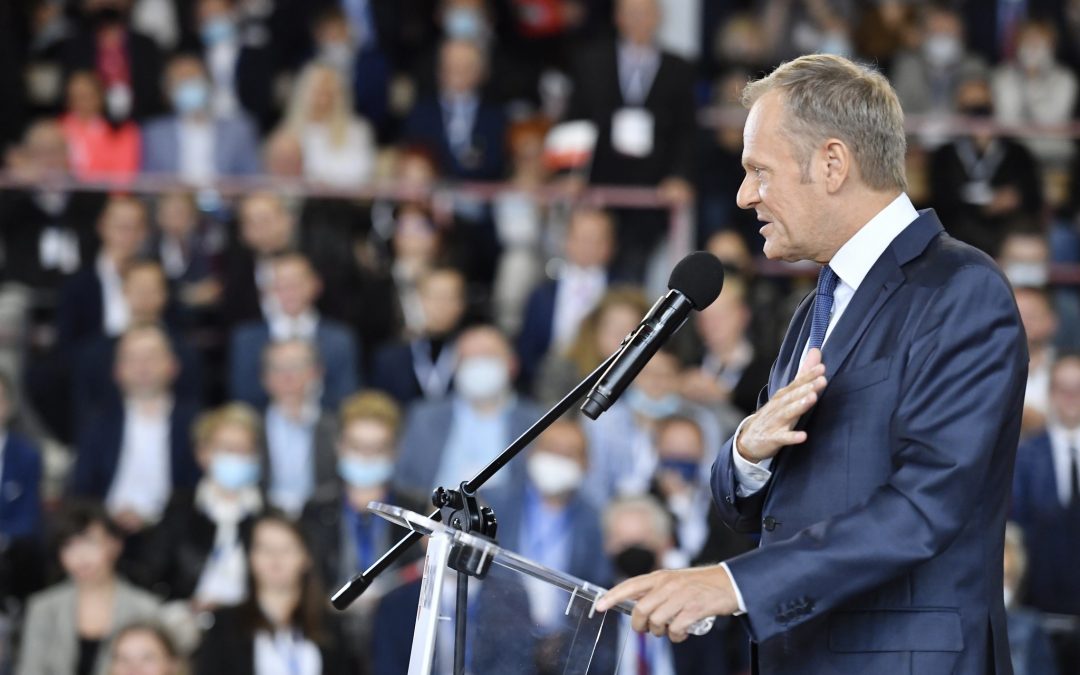Opposition leader Donald Tusk has promised to lead a “march towards modernity and tolerance”, including loosening Poland’s strict abortion laws and introducing same-sex civil partnerships. He also pledged to “look at” transgender rights, but admitted that adoption by same-sex couples is not something that could be introduced soon.
“We have a bill on legal abortion up to 12 weeks [of pregnancy], which would be a decision made by the woman in consultation with a doctor, and not the decision of a priest, prosecutor or PiS [ruling party] activist,” said Tusk. “We will guarantee it 100%.”
Tusk was referring to a policy approved by his Civic Platform (PO) party in February last year that would not only undo the near-total abortion ban introduced the previous month, but also make abortions available for women due to an “extremely difficult personal situation” and “after consultation with a psychologist and doctor”.
That would create a more liberal abortion law than the one that existed before the near-total ban, which only allowed abortion if the mother’s life or health was threatened, if the pregnancy resulted from rape or incest, or if serious birth defects were diagnosed in the foetus.
Tusk, who was speaking yesterday at a meeting in the city of Wałbrzych, also pledged to allow same-sex couples to enter legally recognised civil unions.
“I know that this is the first step and still not popular in various circles, but we have to show that in matters of dignity, there can no longer be a purely political calculation that, for example, it is not beneficial to make a decision because it won’t have the support of the majority,” he said.
“I am trying to pursue a march towards modernity and tolerance, which must take root not only in the law, but in our heads and hearts,” Tusk added.
Tusk admitted that he faces challenges persuading even some within his own party, where there are people with “different types of sensitivities”. PO is generally centrist, but has more liberal and conservative factions, meaning it has often struggled to present a clear line on issues such as abortion and LGBT rights.
In August last year, Tusk also declared that introducing same-sex civil partnerships would be “one of my first decisions” after coming to power. In November he also announced that he accepted the policy of allowing abortion up to 12 weeks, which was adopted by PO before he returned as leader.
On the issue of legalising adoption by same-sex couples, Tusk admitted in Wałbrzych yesterday that this debate “is still ahead of us”. While he “would like people to start accepting and understanding issues they have not understood so far”, he indicated that this would not be a matter decided “right after the elections”.
Tusk also added that procedures for transgender people to change their gender in official records “need to be looked at in great detail” because currently they can be “devastating for the psyche” of those who go through the process.
In 2015, when PO was still in power, parliament approved legislation to make that legal process less onerous. The bill was, however, vetoed by newly elected President Andrzej Duda, who is an ally of Law and Justice (PiS), the national-conservative party now in government.
During his remarks in Wałbrzych, Tusk declared that if PiS were defeated at the next parliamentary elections, scheduled to take place in autumn 2023, it would be a victory against “xenophobia, contempt for difference, lack of respect for people of different sexual or transgender orientation”.
Opinion polling in Poland has shown growing support for more liberal laws on abortion and LGBT rights. The largest proportion of Poles want a return to the abortion law that existed before last year’s near-total ban, while a significant minority favour even further liberalisation.
Last year, state research agency CBOS found that 36% of the public support same-sex partnerships, up six percentage points since 2019 and ten since 2015. Surveys by other pollsters have in recent years found a growing majority now in favour of same-sex partnerships.
At the same time, however, there has been a vocal campaign – led by PiS and parts of the Catholic church – against what they term “LGBT ideology”. Poland has for the last three years been ranked as the worst country in the EU for LGBT people in terms of their legal situation and the social climate they face.

Daniel Tilles is editor-in-chief of Notes from Poland. He has written on Polish affairs for a wide range of publications, including Foreign Policy, POLITICO Europe, EUobserver and Dziennik Gazeta Prawna.




















